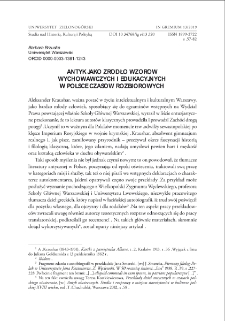Zielonogórska Biblioteka Cyfrowa udostępnia 65 553 obiektów cyfrowych
Obiekt
Tytuł: Antyk jako źródło wzorów wychowawczych i edukacyjnych w Polsce czasów rozbiorowych = About role models derived from classical authors in the 18th- and 19th-century Poland
Współtwórca:
Tytuł publikacji grupowej:
Streszczenie:
Druga połowa XVIII wieku, czasy klasycyzmu stanisławowskiego, a potem wiek XIX przyniósł w Polsce falę przekładów z łaciny i greki, co wynikało z jednej strony z malejącej liczby osób mogących czytać klasyków Grecji i Rzymu w oryginale, z drugiej strony zaś z przekonania o nadzwyczajnych możliwościach formacyjnych w procesie wychowania młodych ludzi, które miały wynikać z takiej lektury. ; Zmieniające się warunki polityczne w kraju, zmieniające się prądy literackie wpływały wydatnie i na wybór przekładanych autorów, i na sposób lektury ich dzieł, i na wybierane do upowszechniania wzory osobowe bądź postawy obywatelskie. Ale też pojawiali się antybohaterowie z antyku spoza grona "oczywistych", nieraz zaskakujący. ; Artykuł, którego podstawową bazą były teksty towarzyszące przekładom, przedstawia cele, jakie stawiali sobie tłumacze literatury antycznej w Polsce w trudnych dla niej czasach. Wiele interesującego materiału przynoszą też recenzje ich pracy ukazujące się w ówczesnej prasie oraz rozważania teoretyczne dotyczące funkcji pracy translatorskiej.
Abstract:
The nineteenth century in Poland brought about a surge in the number of translations from Latin and Greek, which resulted from the diminishing number of people who were able to read Greek and Latin classics in the original languages, on the one hand, and on a widely held conviction about extraordinary formative qualities of this literature in the process of educating young people, on the other. ; The chang?ing political situation in the country and the evolving literary tastes were both key factors influencing the choice of authors to be translated as well as the way their works were being read or interpreted, and impacting the role models and examples of civic virtue that were picked out as worthy of promulgating. At the same time, however, there appeared a number of anti-heroes from Antiquity who were not always that "obvious" and sometimes downright surprising - and some attitudes that we would not be so quick to condemn today were nevertheless rejected, or even abhorred, by some people living in the 19th century. ; The goals that the translators of classical literature in Poland set for themselves and often laid out in the prefaces or introductions to their translations, as well as opinions expressed in book reviews appearing in the 19th-century press in conjunction with theoretical reflexion on the functions of translation are all meant to serve as material for this article.
Wydawca:
Zielona Góra: Oficyna Wydawnicza Uniwersytetu Zielonogórskiego
Format:
Identyfikator zasobu:
DOI:
Strony:
Źródło:
In Gremium : studia nad historią, kulturą i polityką, tom 13
Jezyk:
Prawa do dysponowania publikacją:
Biblioteka Uniwersytetu Zielonogórskiego
Identyfikator oryginału:
Kolekcje, do których przypisany jest obiekt:
- Zielonogórska Biblioteka Cyfrowa > Repozytorium > Jednostki organizacyjne > Wydział Humanistyczny
- Zielonogórska Biblioteka Cyfrowa > Repozytorium > Typy utworów > Artykuły
- Zielonogórska Biblioteka Cyfrowa > Repozytorium > Czasopisma naukowe i serie wydawnicze UZ > In Gremium. Studia nad Historią, Kulturą i Polityką
Data ostatniej modyfikacji:
10 lut 2025
Data dodania obiektu:
10 lut 2025
Liczba wyświetleń treści obiektu:
209
Wszystkie dostępne wersje tego obiektu:
https://www.zbc.uz.zgora.pl/publication/92198
Wyświetl opis w formacie RDF:
Wyświetl opis w formacie OAI-PMH:
Obiekty Podobne
Gorzelana, Joanna Kulczycka, Dorota - red. nauk. Seul, Anastazja - red.
Zabłocki, Franciszek (1752-1821) Czachowski, Kazimierz (1890-1948) - oprac. Jakubowski, Jan Zygmunt (1909-1975) - wstęp
Dąbrowski, Stefan Bartkiewicz, Kazimierz (1930-2002) - red.
Burda, Bogumiła Bartkiewicz, Kazimierz (1930-2002) - red.

